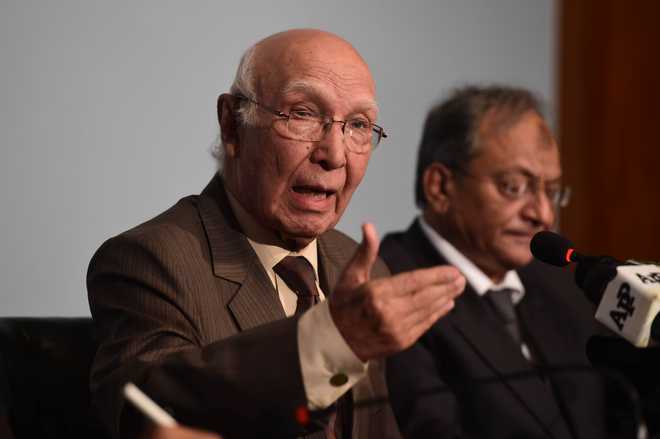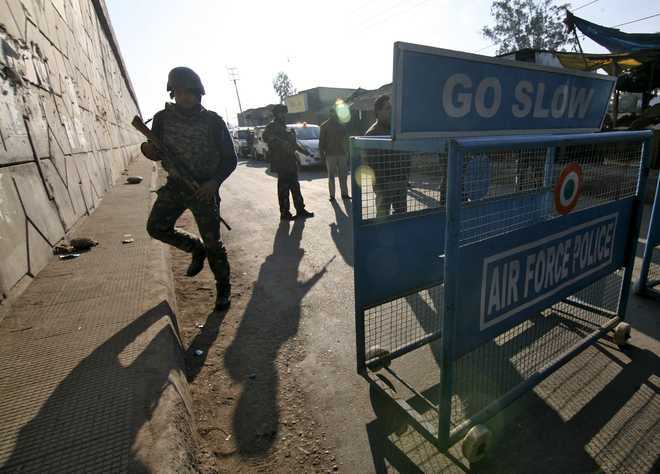This photo taken on January 2, 2016, shows security personnel stand guard next to a barricade outside the Indian Air Force base at Pathankot in Punjab. Reuters file photo
Jammu, June 21
Some militants are suspected to be hiding in villages near Pathankot and could attack the Indian Air Force base that had been attacked in January, the Parliamentary Standing Committee (PSC) on Home Affairs said on Tuesday.
The committee, which was in Jammu to review the security along India’s international border, had earlier gone to Pathankot.
“After going back from Pathankot, we made our suggestions to the government and said that there can be further attack on Pathankot… We were told by the villagers that some terrorists were still hiding in the villages there,” committee Chairman P Bhattacharya told reporters.
(Follow The Tribune on Facebook and Twitter @thetribunechd)
After the recommendation of the committee, the government has alerted the CRPF, BSF and the army and handed over the security of the airbase to them, he said.
“Do you know that a few days ago, government asked the CRPF, BSF and the Army to guard the air force station because some terrorists are hiding there? How they are hiding there, it is not my business to find out but as we got the information from the villagers, it was very clear to us that they are hiding somewhere. We have informed the Government of India about it,” Bhattacharya said.
When asked to comment on the permission granted by the Indian Government to Pakistan’s joint investigation team to visit the airbase to investigate January’s attack, he said he was not in favour of allowing Pakistani intelligence officers to visit the strategic facility.
“The committee does not support the idea of the Government of India of bringing this intelligence branch of Pakistan here. What for? But for any foreign policy of the Government of India, we are not the proper forum, we cannot take the decision to do this and not to do this”, he said.
A five-member Joint Investigation Team (JIT) from Pakistan had visited India between March 27 and 31 to collect evidence with regard to the attack.
Bhattacharya said the policy guidelines have to be framed by the Indian government.
“The committee conducted intensive tours of Indo-Bangla border and India-Pakistan border and now we are heading towards Srinagar. We went to Pathankot which is the most vulnerable area”, he said.
The committee said it was satisfied with the measures being taken by the BSF to check infiltration, but advocated providing fully modern equipment to the force.
“As of now, they have explained to us the way they are trying to prevent infiltration. You cannot say what is happening today or tomorrow but up till now, it is all right,” Bhattacharya said.
Replying to a question regarding Pakistan violating international norms on the IB by constructing concrete bunkers, Bhattacharya said India should take up the matter very seriously with Pakistan.
“As I understand from the government of India’s stand, they have taken a strong stand on this issue,” he said.
He added that the BSF jawans guarding the international border in Jammu and other parts of the country need the most modern amenities and equipment.
Referring to the problems faced by troops at the border, Bhattacharya said the committee will submit its recommendations to the ministry of home affairs and the ministry of foreign affairs, but refused to give details. — PTI
India always tried to maintain ‘hegemony’ in South Asia: Pak

Pakistan Prime Minister’s Adviser on Foreign Affairs Sartaj Aziz. AFP file photo
Islamabad, June 21
India always tried to maintain its “hegemony” in the South Asia region and Pakistan has rejected this while “effectively” protecting its interests, Prime Minister’s Adviser on Foreign Affairs Sartaj Aziz has claimed.Answering a question about the Indo-Pak ties in an interview to Samaa TV, Aziz said India has always tried to maintain its hegemony in the South Asia region.(Follow The Tribune on Facebook and Twitter @thetribunechd)“Pakistan rejected this (Indian) hegemony and has effectively protected its interests and its stance over Kashmir, nuclear deterrence and conventional balance,” Aziz was quoted as saying.He maintained that “protecting Pakistan’s sovereignty and vital interests is a great achievement as a nation”.Talking about the Afghan refugees problem, Aziz said it became a security issue for Pakistan as refugee camps have become “safe havens for terrorists” due to unregulated movement.“We have re-established our writ over FATA (tribal areas) but if the Afghan border remains unregulated, our tribal areas can’t stay safe,” he said.Calling for repatriation of Afghan refugees, Aziz said the repatriation would be a gradual movement and Pakistan would need a plan of action for the process.He said Pakistan is paying for the policies it adopted during the Russian invasion of Afghanistan which resulted in five million refugees coming to Pakistan with “drugs, guns bringing instability”.Aziz claimed that when the current government came to power, it decided to pursue the policy of non-interference which meant Pakistan would not fight someone else’s wars. PTI

